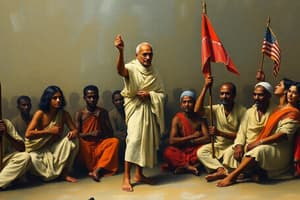Podcast
Questions and Answers
What was the main reason behind the Indian tribal population getting involved in wider politics?
What was the main reason behind the Indian tribal population getting involved in wider politics?
- Faith in Gandhi (correct)
- Influence of European landlords
- Modern political conflict
- Introduction of new forest laws
What distinguished the movements organized by local leaders in tribal areas from the Gandhian movements?
What distinguished the movements organized by local leaders in tribal areas from the Gandhian movements?
- Faith in non-violence
- Connection with Congress movement
- Common aims and forms (correct)
- Influence of European landlords
How did Badridutt Pande view Gandhi's role in the movement against forced labor and forest laws?
How did Badridutt Pande view Gandhi's role in the movement against forced labor and forest laws?
- Gandhi was seen as a colonial supporter
- Gandhi was considered a savior sent by God (correct)
- Gandhi was viewed as an advocate for bania raj
- Gandhi was criticized for promoting conflict
What did Richard Tucker argue about the political conflict reaching the hills for the first time?
What did Richard Tucker argue about the political conflict reaching the hills for the first time?
Why were local leaders like Sailajananda Sen able to mobilize the Santhal grievances in Midnapur district?
Why were local leaders like Sailajananda Sen able to mobilize the Santhal grievances in Midnapur district?
What was one of the distinguishing features of the movements organized against local grievances in tribal areas?
What was one of the distinguishing features of the movements organized against local grievances in tribal areas?
What motivated Alluri Sita Rama Raju to start guerilla warfare in January 1922?
What motivated Alluri Sita Rama Raju to start guerilla warfare in January 1922?
How did the imagined Gandhi differ from the real Gandhi among tribal populations?
How did the imagined Gandhi differ from the real Gandhi among tribal populations?
What impact did the imagined power of Gandhi have on tribal populations in Bengal?
What impact did the imagined power of Gandhi have on tribal populations in Bengal?
What was the significance of the hillmen of Kumaun raising slogans in praise of Gandhi and Swatantra Bharat (independent India)?
What was the significance of the hillmen of Kumaun raising slogans in praise of Gandhi and Swatantra Bharat (independent India)?
What was a common misconception held by tribal populations regarding Gandhi's protective power?
What was a common misconception held by tribal populations regarding Gandhi's protective power?
How did Alluri Sita Rama Raju's attempt at guerilla warfare differ from the traditional fituri practice in Gudem Hills?
How did Alluri Sita Rama Raju's attempt at guerilla warfare differ from the traditional fituri practice in Gudem Hills?
Study Notes
Tribal Agitation in India
- In the Gudem Hills of Andhra, Alluri Sita Rama Raju preached Gandhi's message of temperance and khadi, but believed India could be liberated only by force.
- In 1922, Raju started guerilla warfare, aiming to take the battle beyond the tribal territory of the Gudem region, but was captured and executed in 1924.
- Despite the Congress's lukewarm support, tribal populations in India developed a consciousness connected to the wider anti-colonial struggle.
Gandhi's Imagined Power
- Peasants believed Gandhi had extraordinary occult power, thinking he could heal diseases, reward followers, and punish non-believers.
- Rumors among tribals in Bengal revealed their faith in Gandhi's protective power, believing wearing a Gandhi cap or chanting his name would protect them from police bullets.
Tribal Activism
- Chanting Gandhi's name, peasants participated in activities that crossed Gandhian ideals, such as looting markets and fisheries, and violating forest laws.
- In north Bihar, messianic expectations led to market looting incidents and defiance of authority.
- Tribal peasants in Bengal and north Bihar displayed unprecedented mass activism, breaking the barrier of fear.
Localized Movements
- In tribal areas, local leaders organized movements against localized grievances, building on existing traditions of dissent.
- These movements had little in common with the aims and forms of Gandhian movements, despite a faith in Gandhi.
Examples of Localized Movements
- In the hills of Kumaun and Garhwal in UP, Badridutt Pande organized a militant movement against forced labor and forest laws.
- In Midnapur district of Bengal, local leaders like Sailajananda Sen mobilized Santhals against European landlords and the colonial state.
Studying That Suits You
Use AI to generate personalized quizzes and flashcards to suit your learning preferences.
Description
Explore the relationship between Gandhi and the Indian tribal population, as well as the unique movements that emerged in tribal areas with differing aims and forms than traditional Gandhian movements.




